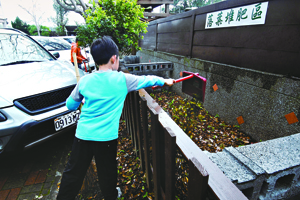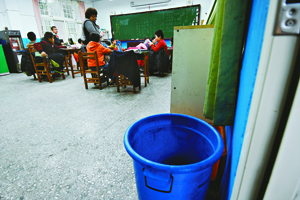

| One Bag A Day: Bucking Tradition | ||||||||
| By Ye Zi-hao Translated by Tang Yau-yang Photos by Yan Lin-zhao | ||||||||
As they worked harder to make their school cleaner, they realized they were actually using more plastic garbage bags in the process, thereby creating undesirable garbage themselves. But does cleanliness have to come at an environmental cost? At this elementary school, the answer is a resounding, “No!” Now just one plastic garbage bag a day is used for the whole school, without cleanliness being sacrificed.
Waishe Elementary School, located in Taoyuan County in northern Taiwan, is about a hundred years old. Big trees, themselves quite old, dominate the campus. Students have to sweep away a lot of fallen leaves every day. But instead of putting those leaves into plastic garbage bags to be taken away, students dump them into a compost area. In one fell swoop, they keep their campus clean and tidy and collect excellent raw materials to enrich the soil. The compost piles offer nutrients to plants at the school and attract Japanese rhinoceros beetles to lay eggs. Students then can study the life cycle of the insects and increase their knowledge of nature. Indoors, the school uses garbage cans just as most other places do, but with one difference—they do not line their cans with plastic bags to facilitate garbage collection and keep the cans clean. Instead, the cans (without bags) are emptied into a large plastic bag by the side door of the school. Instead of small garbage bags going into larger ones, the school uses just one garbage bag of about 30 liters (8 gallons) a day. School officials said that one such bag is enough to hold the rubbish from the entire school for one day. The school is also active in lowering the consumption of resources, such as water and electricity. For its efforts, the school has earned a “low-carbon campus” certification from the Environmental Protection Bureau of Taoyuan County.
Eco-friendly culture Principal Zheng Shu-zhen (鄭淑珍) is a member of the Tzu Chi Teachers Association. She came to know Tzu Chi recycling volunteers in Taoyuan in 2001 and subsequently helped establish the Zhonglu Recycling Station. She was assigned to Waishe Elementary School as principal in August 2012, and she has since exposed students to concepts of environmental conservation.
When Zheng first arrived at the school, she found that it had nice, newly built restrooms. She wanted to keep them clean and well maintained. The restrooms were in use seven days a week because the school was open to the public on weekends. Cleaning the bathrooms once every day or every couple of days was not enough to keep them pleasant to the users. Cleaning them at this rate also made it harder for the caretakers. At Zheng’s suggestion, the school decided to change the cleaning schedule. Middle- and upper-grade students were assigned to give the bathrooms a basic cleaning three times a day, once each in the morning, at noon, and in the afternoon. On Monday mornings, the cleaning was done by caretakers—more extensive cleaning was required to handle what the public had left behind over the weekend. Stepping up the cleaning frequency made the bathrooms vastly cleaner, but more plastic bags were used as a result. The teachers at the school had told their students how the abuse of non-biodegradable plastic bags could cause severe damage to the environment. The rise in plastic bag usage on campus was clearly not in line with their culture of eco-friendliness. The school teachers and administrators therefore began to think up ways to reverse that. “At first, we folded old newspapers or flyers into cylindrical shapes and used them to line the garbage cans in the restrooms to replace plastic garbage bags, but that attracted insects,” teacher Gao Cui-min (高翠敏) recalled. “So we tried to use no liners at all for garbage cans placed in the restrooms.” The new practice of using bare, unlined garbage cans took some getting used to. But once the mental barriers had been overcome, this simplified practice in no way diminished the cleanliness of their bathrooms. They had only to wash their garbage cans more often. After that go-bare adjustment had been made in the bathrooms, doing the same in classrooms and offices was much easier. Principal Zheng counted more than 30 garbage cans in the school’s classrooms, offices, and bathrooms. Going without garbage can liners drastically cut down on the number of plastic bags used. In addition to doing the environment a good turn, it helped the school save on its budget. “We haven’t bought plastic bags in more than a year because we’re still using ones that we purchased earlier,” Zheng said. Every school gets limited appropriations for housekeeping and cleaning. Therefore, what they do not spend on plastic bags can be reallocated for the purchase of cleaning tools or even little gifts for eco-minded students.
Another way to save Another event, though at first glance seemingly unrelated to the topic at hand, also has contributed to a further reduction in the use of plastic bags. “One day a student fainted during the morning flag-raising assembly,” said Qiu Ding-wen (邱定文), director of academic affairs. “We later found out that he hadn’t had breakfast. He hadn’t had breakfast in a long time, in fact.” For growing children, going without breakfast for too long is detrimental to their growth and learning. The Taoyuan County government discovered that the ranks of underweight children in the county have been on the rise year after year, so it decided to start a one-year trial of subsidized breakfasts for needy students in September 2013. Waishe Elementary School in particular had more than its share of disadvantaged students who are raised by single parents or grandparents, so it applied to join the trial. It was accepted along with nine other schools. The county approved about half of the 87 students in the school for the breakfast program, and these students ate for free. Though not subsidized, many other students, staffers, and teachers also paid 25 Taiwanese dollars each (80 American cents) to join the breakfast. In all, about 80 people ate breakfast at the school, approximately 75 percent of the school population. Bucking the widespread use of disposable, single-use eating utensils, the school used the award money that it had received when it earned the “low-carbon campus” certification and purchased stainless steel bowls for the students to use. The bowls, unlike disposable ones, are durable and reusable. The school then asked breakfast vendors to put their beverages, such as soy or rice milk, into large containers instead of the usual disposable cups. The beverage is then scooped into the reusable bowls of the students. But what has all this to do with reducing the use of plastic bags? “Before, students came to school carrying their breakfasts in plastic bags: a beverage and a paper container holding the main dish, such as a Chinese omelet,” said Gao Cui-min. “Can you imagine the volume of plastic bags, packaging material and containers for the entire school?” But that waste has been greatly reduced since the breakfast program got under way. “Now the students are eating healthier breakfasts. They no longer need to wait in line at outside vendors to buy their breakfasts, and we’re getting much less garbage,” Gao concluded. “We used to use several [big] trash bags a day,” said Huang Yan-zu (黃燕足), who has served at the school for eight years and is now director of general affairs. “That came down to one bag a day. Now, at times, it takes two or three days to fill a bag completely.” And that is a real benefit for the Earth. |
















|




